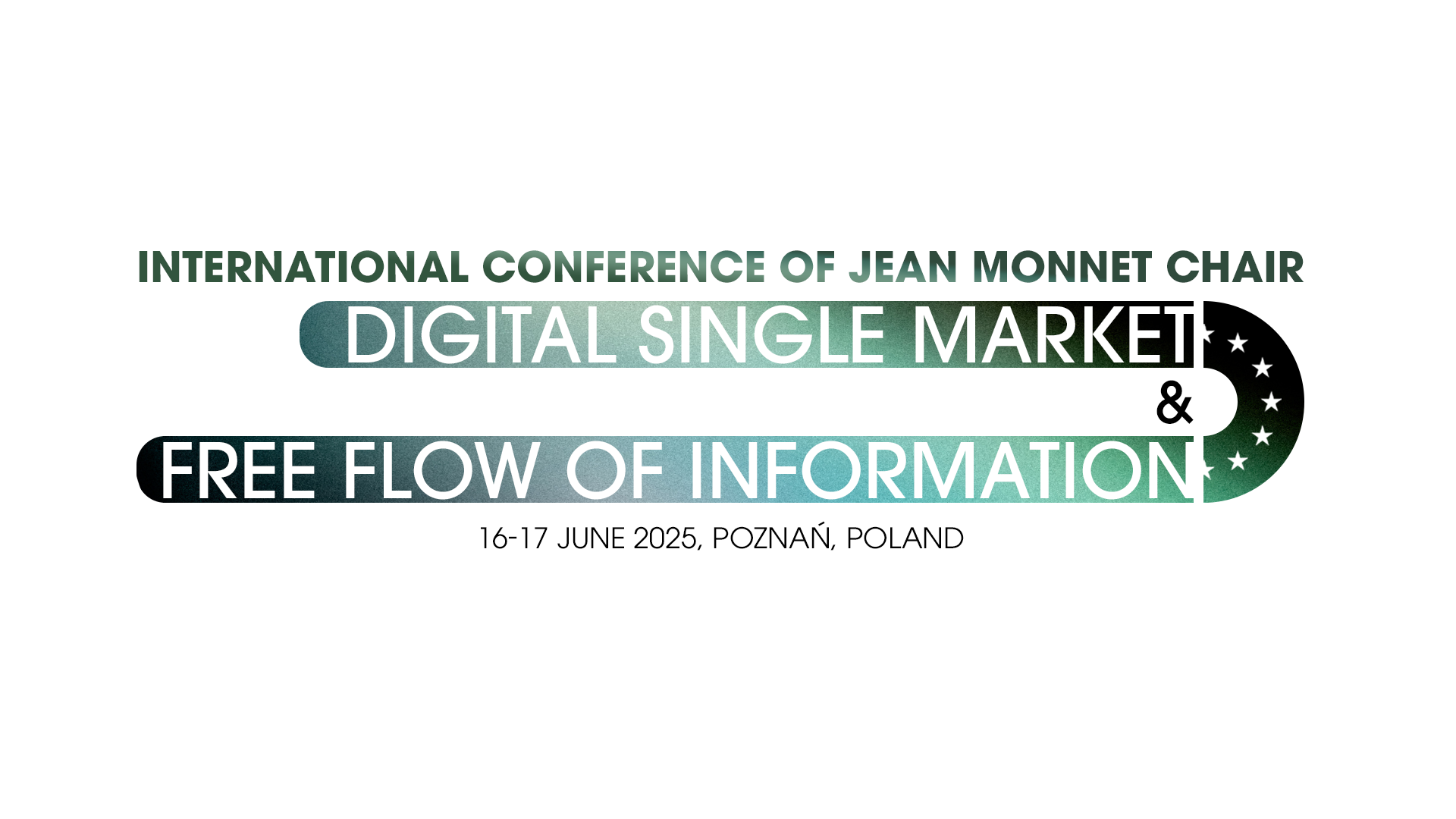Data processing information clause for the participants
of Digital Single Market and Free Flow of Information conference
General Information
Personal data means any information relating to an identified or identifiable natural person (“data subject”). This includes data such as name, surname, address, date of birth, telephone number or email address (the list is not exhaustive).
Personal data is processed in accordance with Regulation (EU) 2016/679 of the European Parliament and of the Council of 27 April 2016 on the protection of natural persons with regard to the processing of personal data and on the free movement of such data, and repealing Directive 95/46/EC (General Data Protection Regulation, hereinafter referred to as: “GDPR”).
This document provides information on personal data processing connected with participation in the Digital Single Market and Free Flow of Information – International Conference of Jean Monnet Chair dig_INFlow.
Data controller
The controller of your data is Adam Mickiewicz University in Poznań with its registered office at 1, Henryka Wieniawskiego Street, 61-712 Poznań (hereinafter referred to as: the “Controller”).
Data Protection Officer
The Controller has appointed a Data Protection Officer, who can be contacted via the following e-mail address: iod@amu.edu.pl.
Purposes and legal bases for data processing
| Purpose of processing | Legal basis for processing under the GDPR | Data retention period |
|---|---|---|
| Dissemination of the call for papers for the conference | Processing is necessary for the purposes of the controller’s legitimate interests (Article 6(1)(f) GDPR) – spreading information about the conference and the call for papers. | One-time action |
| Collection of abstract submissions, their review, and communication of review results | Processing is necessary for the purposes of the legitimate interests of the administrator (Article 6(1)(f) of the GDPR) – the curation of the speaker line-up for the conference and its thematic scope. | Until the completion of the abstract review process |
| Registration of conference participants | Processing is necessary for the purposes of the legitimate interests of the administrator (Article 6(1)(f) of the GDPR) – forecasting the number of participants and ensuring the proper preparation of the conference. | Until the end of the conference |
| Dissemination of information about the speaker line-up | Processing is necessary for the purposes of the legitimate interests of the administrator (Article 6(1)(f) of the GDPR) – spreading information about the conference and promoting it. | Until the end of the conference |
| Organizing and holding the conference | Processing is necessary for the purposes of the legitimate interests of the administrator (Article 6(1)(f) of the GDPR) – ensuring the proper conduct of the conference. | Until the end of the conference |
| Recording the conference, evidencing the conduct of the conference and its outcomes | Processing is necessary for the purposes of the legitimate interests of the administrator (Article 6(1)(f) of the GDPR) – securing evidence for the purposes of reporting on the proper organization and the conduct of the conference. | Until the end of the conference |
| Publication of post-conference materials | Processing is necessary for the purposes of the legitimate interests of the administrator (Article 6(1)(f) of the GDPR) – spreading the information about the outcomes of the conference, attaining publicity concerning its results. | For the period in which the materials are used |
| Establishing claims or defence against claims | Processing is necessary for purposes arising from the legitimate interests of the administrator (Article 6(1)(f) RODO) – establishing, investigating, or defending against claims made as part of actions taken prior to the initiation of proceedings, in court proceedings, enforcement proceedings, or before other state authorities. | Until the end of claim limitation period |
Recipients of data
Your personal data may only be shared with trusted recipients, in particular providers of IT services, mail and courier service providers. The data may also be shared with public authorities on demand.
Data retention period
Your data will be retained at most for the period indicated in the table above. These should be understood as maximum periods. Consequently, if the purpose of processing given personal data is realised before the end of the indicated retention period, the Controller shall delete or anonymise the personal data sooner.
Your rights
You have the right to:
- access your data, including the right to obtain a copy of the data – on the legal basis of art. 15 GDPR,
- request rectification (correction) of your personal data – on the legal basis of art. 16 GDPR,
- request that the Controller delete your data – within the premises and under the conditions specified in art. 17 GDPR,
- request that the Controller restricts the processing of your data – within the premises and under the conditions specified in art. 18 GDPR,
- transfer personal data – within the premises and under the conditions specified in art. 20 GDPR,
- object to the data processing – within the premises and under the -conditions specified in art. 21 GDPR – particularly to the data processing on art. 6(1)(f) GDPR.
Each request concerning the exercise of your rights will be verified and reviewed by the Controller in due time and responded to promptly.
If you consider that the Controller’s processing of your personal data violates the provisions of the GDPR, you have the right to lodge a complaint with the supervisory authority, i.e. the Polish Data Protection Commissioner, whose office is located at ul. Stawki 2, 00-193 Warszawa.
Voluntariness of data provision
Providing your personal data is voluntary, yet necessary for the submission of an abstract, registration for the conference and participation in it.
Automated decision-making
Your personal data will not be used for the purposes or subjected to automated decision-making, including profiling.
Transfer of data to third countries or international organizations
Your personal data will not be transferred to third countries or international organizations.
